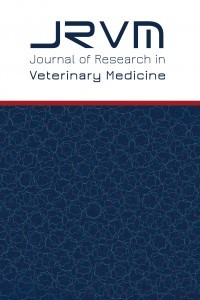Kanatlı Hayvanların Rasyonlarında Fitaz Enzimi Kullanılmasının Önemi
Kanatlı hayvanlar, fitik asit, fitat fosforu, fitaz enzimi
Significance of Using Phytase Enzyme in Poultry Ration
Poultry, phytic acid, phytate phosphororous, phytase enzyme,
___
- Ballam, G.C., Nelson, T.S., Kirby, L.K., 1984. Effect of fiber and phytate source and of calcium and phosphorus level on phytate hydrolysis in the chick. Poultry Sci., 63, 333-338.
- Broz, J., Oldane, P., Perrin-Voltz, A.H., Rychen, G., Schulze, J. And Nuches, C.S., 1994. Effect of supplemental phytase on performance and phosphorus utilization in broiler Chickens fed low phosphorus diet without addition of inorganic phosphorus. Brit. Poult. Sci., 35, 273-280.
- De Boland, A.R., Gamer, G.B., O`Dell, B.L., 1975. Identification and properties of phytate in cereal grains and oil seed products. J. Agricul. Food Chem., 23, 1186-1189.
- Denbow, D.M., Ravindran, V., Kornegay, E.T., Yi, Z., Hulet, R.M., 1995. Improving phosphorous availability in soyabean meal for broilers by supplemental phytase. Poultry Sci., 74, 1831-1842.
- Deniz, G., Gezen, S.S., Kara, C., Gencoglu, H., Meral, Y., Baser, E., 2013. Evaluation of nutrient equivalency of microbial phytase in hens in late lay given maize-soybean or distiller's dried grains with solubles (DDGS) diets. Brit. Poult. Sci., 54, 494-502.
- Edwards, H.M. Jr., 1993. Dietary 1, 25-dihydroxycholecalciferolsupplementaion increases natural phytate phosphorus utilization in chickens. J. Nutr., 123, 567-577.
- Edwards, H.M. Jr., Palo, P., Soonchaerenyıng, S., Elliot, M.A. 1989. Factors influencing the bioavailability of phytate phosphorus to chickens. In: SOUTHGATE, D., JOHNSON, I. and FENWICK, G.R. (Eds) Nutrient availability: Chemical and Biological Aspects, pp. 271-276.
- Engelen, A.J., Van Der Heeft, E.C., Randsdorp, P.H.G., Smith, E.L.C. (1994) Simple and Rapid determination of phytase activity. J. Assoc. off Ana. Chem., 77, 760-764.
- Gordon, R.W., Roland, S.R. 1997. Performance of commercial laying hens fed various phosphorus levels with and without supplemental phytase. Poultry Sci., 76, 1172-1177.
- Kies, A.K., Van Hemert, K.H.F., Saucer, W.C., 2001. Effect of phytase on protein and amino acid digestibility and energy retention. World Poultry Sci. J., 57, 109-126.
- Knuckles, B.E., Betschart, A.A., 1987. Effect of phytate and other myo-inositol phosphate esters on alpha-amylase digestion of starch. J. Food Sci., 52, 719-721.
- N.R.C., 1994. In: Nutrient Requirements of Poultry, 9th ed., National Academy Press, Washington DC, USA. Nelson, T.S., 1967. The utilization of phytate phosphorus by poultry: a review. Poultry Sci., 46: 862-871.
- Nelson, T.S., Shieh, T.R., Wodzinski, R.J., Ware, J.H., 1971. Effect of supplemental phytase on the utilization of phytate phosphorus by chicks. J. Nutr., 101,1289-1294.
- Pallauf, J., Rimbach, G., 1997. Nutritional significance of phytic acid and phytase. Arc. Anim. Nutr., 50, 301-319.
- Punna, S., Roland, S.R., 1999. Influence of supplemental phytase on first cycle laying hens fed phosphorus deficient diets from day one of age. Poultry Sci., 78, 1407-1411.
- Qian, H., Kornegay, E.T., Denbow, D.W., 1996. Phosphorus equivalence of microbial phytase in turkeys diets as influenced by calcium to phosphorus ratios and phosphorus levels. Poultry Sci., 75, 69-81.
- Rama Rao, S.V., Reddy, V.R., Reddy, R.S., 1999. Enhancement of phytate phosphorus availability in the diets of commercial broilers and layers. Anim. Feed Sci. Tech., 79, 211-222.
- Ravindran, V., Carbahug, S., Ravindran, G., Selle, P.H., Bryden, W.L., 2000. Response of broiler chickens to microbial phytase supplementation as influenced by dietary phytic acid and non-phytate phosphorous levels. II. Effects on apparent metabolisable energy, nutrient digestibility and nutrient retention. Brit. Poult. Sci., 41, 193-200.
- Sebastian, S., Touch Burn, S.P., Chavez, E.R., 1998. Implications of Phytic acid and supplemented microbial phytase in poultry nutrition: a review. World Poultry Sci. J., 54, 27-47.
- Simons, P.C.M., Versteegh, H.A.J., Jongbloed, A. W., Kemme, P.A., Slump, P., Bos, K.D., Wolters, M.G.E., Beudeker, R.F., Verschooor, G.J., 1990. Improvement of phosphorus availability by microbial phytase in broilers and pigs. Brit. J. Nutr. 64, 525-540.
- Singh, P.K., Khatta, V.K., 2002. Phytase supplementation for economic and eco-friendly broiler production. J. Econ Physiol., 5, 117-121.
- Singh, P.K., 2002. Utilisation of phytic acid in poultry diets. Poultry Planner, 3 (11): 17–19.
- Singh, P.K., 2004. Wheat: An alternative of maize in poultry rations? Poultry Line, 4, 23-26.
- Sohail, S.S., Roland, S.R., 2000. Influence of phytase on calcium utilization in commercial layers. J. Appl. Poultry Res., 9, 81-87.
- Wise, A., 1983. Dietary factors determining the biological activity of phytase. Nutr. Abstr. Rev., 53: 791-806. Wodzinski, R.J., Ullah, A.H.J., 1996. Phytase. Adv. Appl. Microbiol., 42, 263-303.
- Başlangıç: 1981
- Yayıncı: Bursa Uludağ Üniversitesi
Holstein-Friesian Irkı Bir Buzağıda Boynuz Köreltme Sonrası Beyin Hasarı
Volkan İpek, Gülşah Akgül, Ahmet Akkoç, Barış Akgül
Balarılarında Varroa destructor Enfestasyonuna Karşı Pudra Şekeri Etkinliğinin Araştırılması
Mustafa Necati MUZ, Servet ASLAN, Ahmet Onur GİRİŞGİN
İmmünglobulinler ve Septisemi
Subklinik Laminitis ile İlgili Araştırmalar
Serkan Çatık, Evren BULGAÇ ERTEN, Hakan Salcı
Kanatlı Hayvanların Rasyonlarında Fitaz Enzimi Kullanılmasının Önemi
Tayların Beslenmesi ve Beslenme Hastalıkları
Shrink film, Depolama Süresi ve Sıcaklığının Sofralık Yumurtalarda İç ve Dış Kalite Üzerine Etkileri
